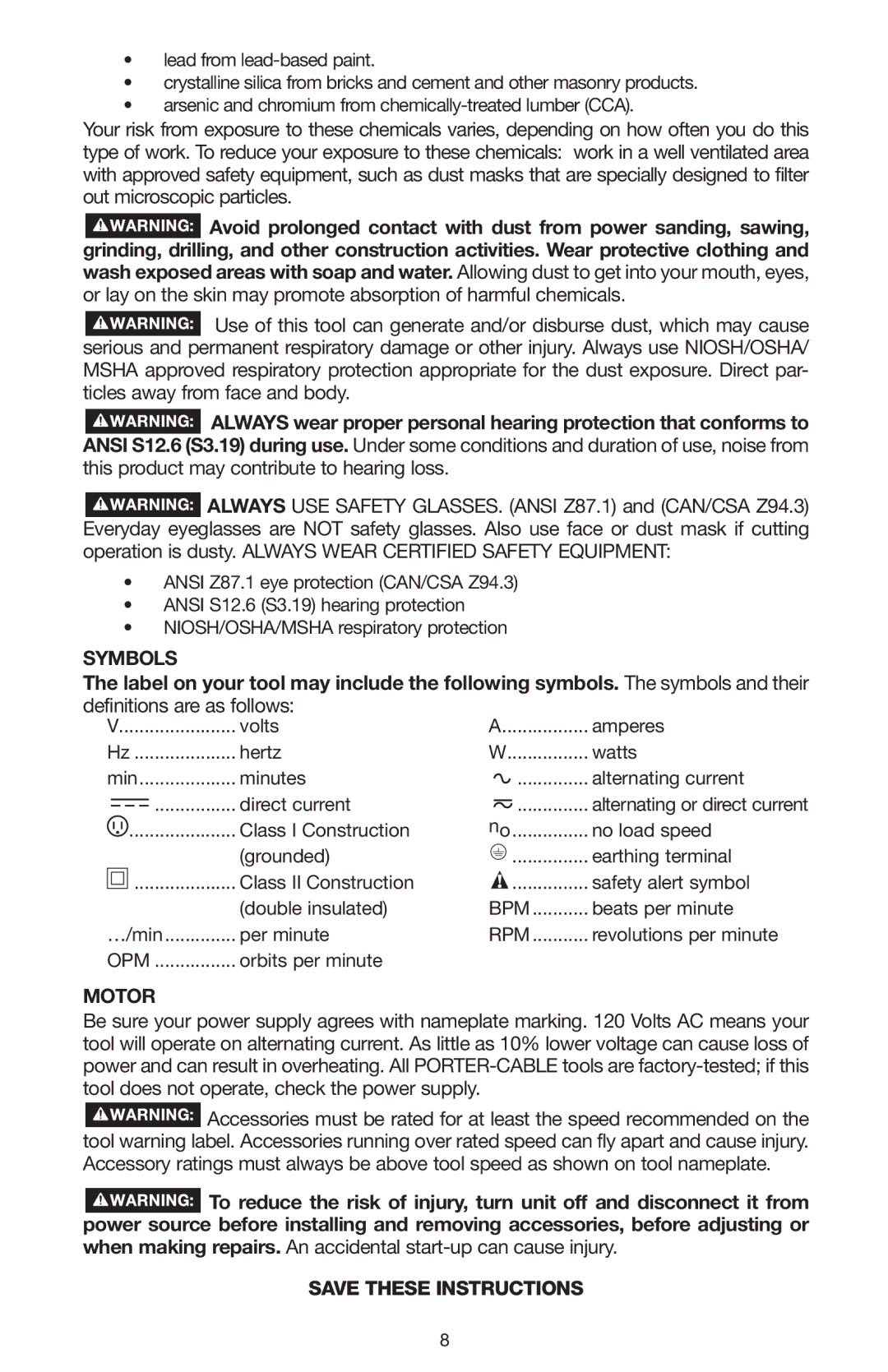
•lead from
•crystalline silica from bricks and cement and other masonry products.
•arsenic and chromium from
Your risk from exposure to these chemicals varies, depending on how often you do this type of work. To reduce your exposure to these chemicals: work in a well ventilated area with approved safety equipment, such as dust masks that are specially designed to filter out microscopic particles.
![]() Avoid prolonged contact with dust from power sanding, sawing, grinding, drilling, and other construction activities. Wear protective clothing and wash exposed areas with soap and water. Allowing dust to get into your mouth, eyes, or lay on the skin may promote absorption of harmful chemicals.
Avoid prolonged contact with dust from power sanding, sawing, grinding, drilling, and other construction activities. Wear protective clothing and wash exposed areas with soap and water. Allowing dust to get into your mouth, eyes, or lay on the skin may promote absorption of harmful chemicals.
![]() Use of this tool can generate and/or disburse dust, which may cause serious and permanent respiratory damage or other injury. Always use NIOSH/OSHA/ MSHA approved respiratory protection appropriate for the dust exposure. Direct par- ticles away from face and body.
Use of this tool can generate and/or disburse dust, which may cause serious and permanent respiratory damage or other injury. Always use NIOSH/OSHA/ MSHA approved respiratory protection appropriate for the dust exposure. Direct par- ticles away from face and body.
![]() ALWAYS wear proper personal hearing protection that conforms to ANSI S12.6 (S3.19) during use. Under some conditions and duration of use, noise from this product may contribute to hearing loss.
ALWAYS wear proper personal hearing protection that conforms to ANSI S12.6 (S3.19) during use. Under some conditions and duration of use, noise from this product may contribute to hearing loss.
![]() ALWAYS USE SAFETY GLASSES. (ANSI Z87.1) and (CAN/CSA Z94.3) Everyday eyeglasses are NOT safety glasses. Also use face or dust mask if cutting operation is dusty. ALWAYS WEAR CERTIFIED SAFETY EQUIPMENT:
ALWAYS USE SAFETY GLASSES. (ANSI Z87.1) and (CAN/CSA Z94.3) Everyday eyeglasses are NOT safety glasses. Also use face or dust mask if cutting operation is dusty. ALWAYS WEAR CERTIFIED SAFETY EQUIPMENT:
•ANSI Z87.1 eye protection (CAN/CSA Z94.3)
•ANSI S12.6 (S3.19) hearing protection
•NIOSH/OSHA/MSHA respiratory protection
SYMBOLS
The label on your tool may include the following symbols. The symbols and their definitions are as follows:
V | volts | A | amperes | |||||
Hz | hertz | W | watts | |||||
min | minutes |
|
| .............. | alternating current | |||
|
|
|
| direct current | no | alternating or direct current | ||
|
|
| ................ | |||||
|
|
|
| Class I Construction | no load speed | |||
|
| ..................... | ||||||
|
|
|
| |||||
|
|
|
| (grounded) |
|
|
| earthing terminal |
|
|
|
|
|
|
| ||
. | ........................ |
|
|
|
| ................ | ||
|
|
|
|
|
|
| ||
|
| ..................... | Class II Construction |
|
| ............... | safety alert symbol | |
. | ........................ |
|
| (double insulated) | BPM | beats per minute | ||
…/min | per minute | RPM | revolutions per minute | |||||
OPM | orbits per minute |
|
|
|
| |||
MOTOR
Be sure your power supply agrees with nameplate marking. 120 Volts AC means your tool will operate on alternating current. As little as 10% lower voltage can cause loss of power and can result in overheating. All
![]() Accessories must be rated for at least the speed recommended on the tool warning label. Accessories running over rated speed can fly apart and cause injury. Accessory ratings must always be above tool speed as shown on tool nameplate.
Accessories must be rated for at least the speed recommended on the tool warning label. Accessories running over rated speed can fly apart and cause injury. Accessory ratings must always be above tool speed as shown on tool nameplate.
![]() To reduce the risk of injury, turn unit off and disconnect it from power source before installing and removing accessories, before adjusting or when making repairs. An accidental
To reduce the risk of injury, turn unit off and disconnect it from power source before installing and removing accessories, before adjusting or when making repairs. An accidental
Save these instructions
8
